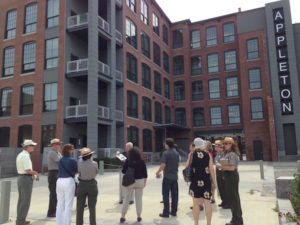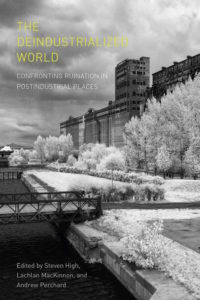 As someone interested in the processes by which some piece of life becomes framed as “past,” I find industrial history endlessly dynamic to think with. In many places around the world, including the part of New England where I live, industry feels and is often understood to be past, but of course it’s not – the capital that propelled it has simply been moved elsewhere. This slippage in time and space is compounded by the fact that industry is still present in virtually everything we encounter in our daily lives, including the warming climate we exist within.
As someone interested in the processes by which some piece of life becomes framed as “past,” I find industrial history endlessly dynamic to think with. In many places around the world, including the part of New England where I live, industry feels and is often understood to be past, but of course it’s not – the capital that propelled it has simply been moved elsewhere. This slippage in time and space is compounded by the fact that industry is still present in virtually everything we encounter in our daily lives, including the warming climate we exist within.
So although I started studying industrial history somewhat inadvertently (I was intending to study immigrant representations and relationships at what just happened to be an industrial history site), it’s become foundational to everything I’m thinking about. Below is some of my work focused specifically on industrial, deindustrialized, and postindustrial places and projects.
- The Lowell Experiment: Public History in a Postindustrial City (University of Massachusetts Press, 2006)
- “Performing the Postindustrial: The Limits of Radical History in Lowell, Massachusetts,” Radical History Review Vol 98 (Spring 2007)
- Review of John H. Chafee Blackstone River Valley National Heritage Corridor, The Public Historian, Vol 31, No 4 (Fall 2009)
- Panelist for “The Cities Project: New Life for New England’s Industrial Past,” International Festival of Arts & Ideas, June 2019, New Haven CT
I’ve also been a visiting scholar at several industrial history sites, including Bethlehem, PA, Lowell, MA, and Paterson, NJ. The picture above shows a scholars’ group getting a tour of Lowell in the summer of 2014. It always intrigues me to be part of these visits because one of the things I’m particularly interested in is the role of people tasked with reframing industry as past, sometimes mourning, memorializing, or trying to understand it, and often repurposing the material traces that industrial capital leaves behind. Here’s some of what I’ve written about that:
- “Serving Up Culture: Heritage and its Discontents at an Industrial History Site,” International Journal of Heritage Studies, Vol 11, Dec 2005
- with Myrna Breitbart, “Touring Templates: Cultural Workers and Regeneration in Small New England Cities.” In Tourism, Culture and Regeneration, Melanie K. Smith, ed. (CAB International, 2006)
- “The Past as a Public Good: The U.S. National Park Service and ‘Cultural Repair’ in Postindustrial Places” in People and Their Pasts: Public History Today, Hilda Kean and Paul Ashton, eds. (Palgrave Macmillan, 2008)
- “Keeping ‘the Industrial’: New Solidarities in Post-industrial Places” in The Deindustrialized World: Confronting Ruination in Postindustrial Places, Steven High, Lachlan MacKinnon and Andrew Perchard, eds. (University of British Columbia Press, 2017)
- “Displaying the industrial: Toward a geneaology of heritage labor” in Labor Volume 16, No 1, 151-70, March 2019 (Stefan Burger and Steven High, special issue eds)
 The two most recent pieces focus on the way that work in the knowledge sector itself is increasingly taking on industrialized qualities (for example, becoming more mechanized, routinized, and geared toward exporting replicable products like designs, plans, exhibits, and brands). I argue that these similarities have the potential to prompt new kinds of alliances between high-status (but often low-security, low-wage) knowledge workers and those in other sectors who are struggling with the more corrosive patterns found in industrial capitalism.
The two most recent pieces focus on the way that work in the knowledge sector itself is increasingly taking on industrialized qualities (for example, becoming more mechanized, routinized, and geared toward exporting replicable products like designs, plans, exhibits, and brands). I argue that these similarities have the potential to prompt new kinds of alliances between high-status (but often low-security, low-wage) knowledge workers and those in other sectors who are struggling with the more corrosive patterns found in industrial capitalism.